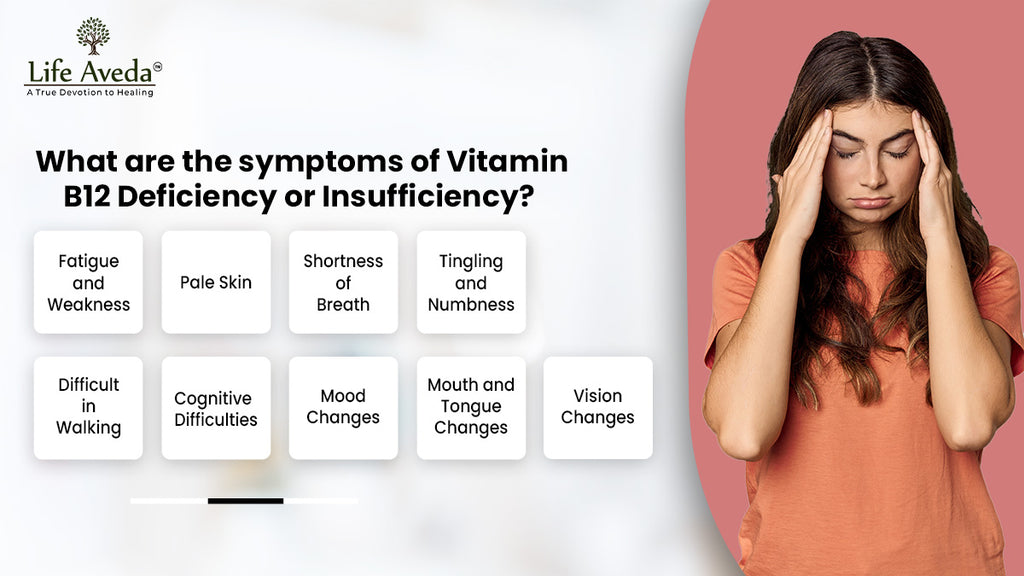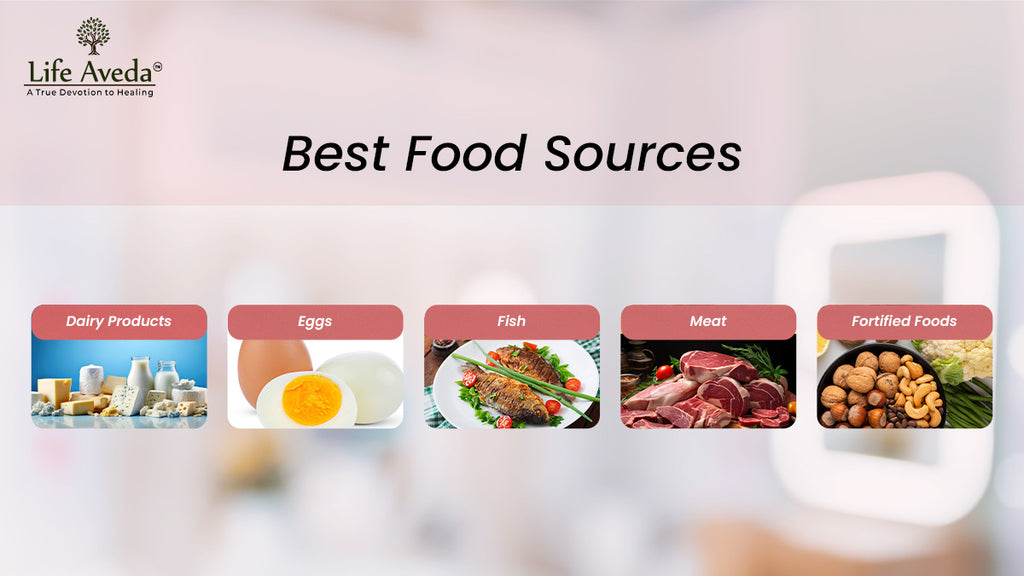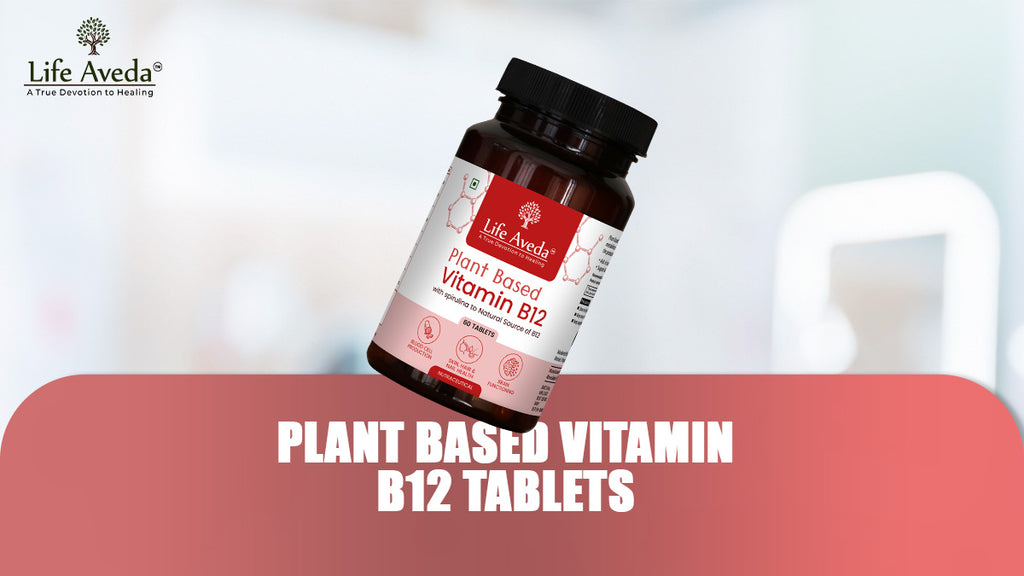The Missing Piece to Your Health Puzzle: Vitamin B12 or Cobalamin
In our body, an adequate quantity of minerals and vitamins are essential for proper functioning, as they support various physiological processes. When there's a deficiency or insufficient amounts of these nutrients, the body shows specific signs and symptoms related to the systems dependent on them. This blog will focus on one such vitamin known as cobalamin, or Vitamin B12. Apart from its crucial role in red blood cell synthesis and hemoglobin production, Vitamin B12 has several other functions within the human body.
Keep reading to know more about Vitamin B12 and its functions in the human body!
Why is Vitamin B12 or Cobalamin Important for your Body?
Red Blood Cell Formation
As mentioned before vitamin B12 plays a crucial role in the synthesis of red blood cells. It is responsible for the formation of hemoglobin. Hemoglobin is a protein responsible for carrying oxygen throughout the body.
Nervous System Function
Vitamin B12 is essential for maintaining the health of the nervous system. It supports the production of myelin, a protective sheath around nerves that facilitates proper nerve conduction which is important as it allows us to sense the world.
DNA Synthesis
Cobalamin or Vitamin B12 is involved in DNA synthesis. DNA synthesis is important for cell division and growth. It helps in the replication and repair of DNA, contributing to overall cellular health.
Energy Production
Vitamin B12 assists in the metabolism of carbohydrates, fats, and proteins, converting them into energy for utilization by the body. It plays a key role in maintaining energy levels and vitality.
Brain Health and Cognitive Function
Adequate levels of Vitamin B12 are important for cognitive function and brain health. It may help prevent cognitive decline and support memory, concentration, and overall mental clarity.
Heart Health
Vitamin B12, along with other B vitamins, helps regulate homocysteine levels in the blood. Homocysteine is an amino and its elevated levels are associated with an increased risk of cardiovascular disease. By keeping homocysteine levels in check, Vitamin B12 supports heart health.
Support During Pregnancy
It's very essential for fetal development during pregnancy. It aids in the formation of the baby's nervous system and red blood cells, making it crucial for a healthy pregnancy and baby.
Management of Certain Health Conditions
Vitamin B12 supplementation may be beneficial for individuals with certain health conditions, such as pernicious anemia, celiac disease, Crohn's disease, and certain gastrointestinal disorders that may impair absorption of this vitamin.
What are the Symptoms of Vitamin B12 or Cobalamin Deficiency or Insufficiency?

Symptoms associated with Vitamin B12 or Cobalamin Deficiency are as follows:
- Fatigue and Weakness: Even after adequate rest and sleep, persisting fatigue and weakness is present.
- Pale Skin: Due to decreased blood cell production the skin color changes into pale or yellowish tint like color.
- Shortness of Breath: During physical exertion these symptoms are common due to Reduced oxygen-carrying capacity of the blood resulting from inadequate red blood cell production.
- Tingling and Numbness: Vitamin B12 deficiency leads to nerve damage. It causes sensations of tingling, numbness, or pins and needles in the hands and feet.
- Difficulty in Walking or Maintaining Balance: B12 deficiency can affect the nerves responsible for motor control and coordination, leading to difficulty walking, unsteady gait, or balance problems.
- Cognitive Difficulties: Deficiency in Vitamin B12 may impair cognitive function, resulting in memory problems, difficulty concentrating, confusion, or brain fog.
- Mood Changes: Mood disorders such as depression, irritability, or changes in mood regulation are also because of the cobalamin deficiency.
- Mouth and Tongue Changes: Tongue inflammation, mouth sores along with sensation of burning and itching are associated with vitamin B12 deficiency.
- Vision Changes: Cobalamin deficiency may lead to optic nerve damage, resulting in vision changes such as blurred or double vision.
Best Food Sources of Vitamin B12 or Cobalamin

Vitamin B12 can be obtained from both vegetarian and non vegetarian sources. Following are the food sources for Vitamin B12:
- Dairy Products: Milk, cheese, yogurt, and other dairy products are good sources of Vitamin B12.
- Eggs: Eggs, particularly the yolk, contain Vitamin B12. Consuming whole eggs provides a good amount of this vitamin.
- Fish: Fish, especially oily fish like salmon, trout, tuna, mackerel, and sardines, are rich sources of Vitamin B12.
- Meat: Lamb, and poultry are excellent sources of Vitamin B12. Organ meats such as liver and kidney are particularly high in Vitamin B12.
- Fortified Foods: Some plant-based foods are fortified with Vitamin B12. These include fortified breakfast cereals, plant-based milk alternatives like soy, almond and oat milk.
Sometimes people cannot change their diet preferences. In such cases one can opt for some Plant Based Vitamin B12 Tablets as well.
Plant Based Vitamin B12 Tablets

Life Aveda's plant-based Vitamin B12 tablets are crafted with powerful ingredients known to be rich sources of Vitamin B12. It has Spirulina (algae) from Spirulina platensis, Chlorella Vulgaris, Triticum aestivum, Medicago sativa and some others as its ingredients. These tablets have benefits as follows:
- They support production of red blood cells.
- Their regular intake helps in preventing nerve damage.
- Plant Based Vitamin B12 Tablets help to maintain overall energy levels.
- The product also supports skin, hair and nail health.
Conclusion
Vitamin B12 is required by the body for carrying out various processes and its deficiency can lead to serious problems. Its multifaceted role to maintain overall health and wellbeing makes it a vital nutrient. As mentioned in the blog it's important for red blood cell production, promotes well being of red blood cells and also aids in energy metabolism. Its deficiency can lead to a range of symptoms, including fatigue, neurological issues, and cognitive difficulties. It's important to be aware of these symptoms and ensure an adequate intake of Vitamin B12 through dietary sources or supplements, especially for individuals at risk of deficiency. Here Plant based Vitamin B12 tablets are of great help as they are natural and work on increasing Vitamin B12 absorption rate as well.


